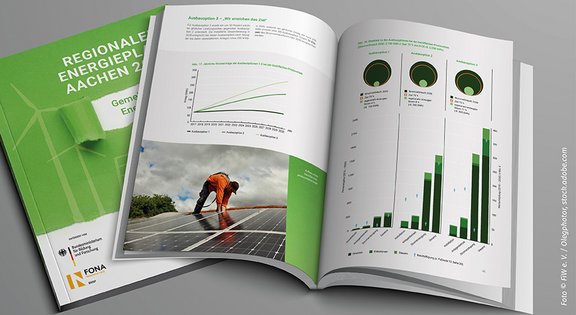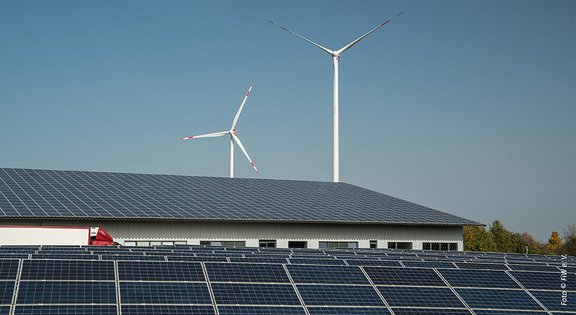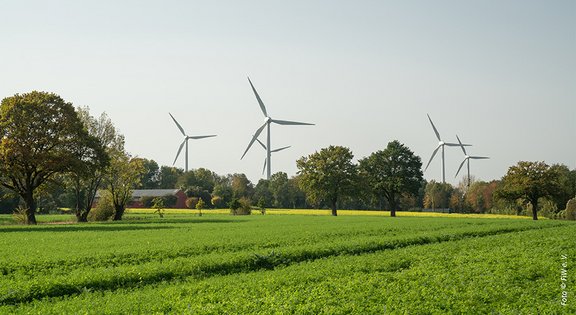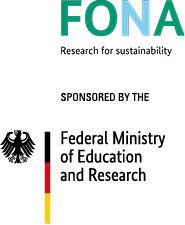render – More renewable energies
Regional dialogue on energy change - together on the way to an energy region
Within the programme "Innovation Groups for Sustainable Land Management" by the German Federal Ministry of Education and Research (BMBF), a strong network of politics, practice and science started under the leadership of the FiW the project "Innovation Group Regional Dialogue Energy Change" (render) successfully.
The centre of render is a "innovation group" of representatives of nine network partners, which manage all project activities and the pilot projects. It is led by the FiW. Other members of the innovation group come from the project partners City of Aachen, Urban Region Aachen, the energy suppliers STAWAG and EWV, BET Aachen, political scientists from RWTH Aachen University and the associated institutes gaiac e. V. Aachen and RISP e. V. Duisburg.
With many associated partners (environmental associations, local energy initiatives, companies, civil society, chambers, etc.), an "Energy Plan for the Aachen Energy Region 2030" was developed. This plan is part of a cross-regional innovation concept "Energy Region Aachen 2030" by the region for the region. It is the central product, where the optimal growth of renewable energies and regional storage capacities are important but also the realisation of region-wide actions. These activities include for example actions for energy efficiency, for decentralised energy supply in residential areas or for cooling or heating networks in industrial and commercial areas. All activities already started by the partners in the network, and the projects at RWTH Aachen University and other actors in the Urban Region Aachen with the topics energy and climate, will be included in the ongoing transformation process, so that no activities are doubled and the resources of the region are used optimally.
In the project work, more than 350 stakeholders from about 120 institutions were put together into a regional dialogue with many different dialogue forums. Looking at the content, in the render project many tools were developed to see an overview of where the Urban Region Aachen is on the way to achieving the climate protection goals. The tools were developed with the help of the enerGIS tool, a climate and energy balance for the Urban Region Aachen, a potential analysis and more. The evaluations have shown that more or less 13 % of the electricity used in the Urban Region Aachen is regional renewable electricity. Therefore, we as a region still have a long way to go to reach the goal of 75 % RE (renewable energies) in total energy consumption in 2030.
The focus of the FiW was, for exmaple, the preparation of a potential study with the topic of green waste as well as the preparation of a study to analyse the creation of values. This way, the already existing and possible value creation in the Urban Region Aachen is estimated and shown through more renewable energies for the period 2014-2030. The focus is on the two very strong renewable energy technologies, wind energy and photovoltaics. The study is available on the render homepage (www.regionaler-dialog-aachen.de). Recommendations for action for politics and the economy were also developed in the study. A summary of these can also be found on the homepage.
Another technical focus lies on the sub-project “Decentralised Energy Supply in the Neighbourhood”. In this pilot project, a local heating and/or cooling cluster in the region was developed and installed as an example with support of GiS-systems. It was planned to show how clusters can create energy-innovative, long-lasting and cost-efficient win-win situations by sharing energy and saving it through reuse. This clusters companies from industry and commercial business, entertainment and public facilities are brought together. For this reason, the FiW identified, with the help of already existing potential analyses of the urban region and other actors, the potentials and needs of heat- and/or cooling-intensive businesses. After this, the FiW analysed their possibility to use and developed first concepts for a cluster for potential heating or cooling islands. At the same time, already known cooperation and paying models for the long-term sustainable operation of a local heating and/or cooling cluster were analysed and further developed in close coordination with the local actors. For selected model cities also thermodynamic calculations were made.
The render project did not end with the handover of the Regional Energy Plan Aachen 2030 (REPAC) in October 2018 to City Region Councillor Helmut Etschenberg and Dr Markus Kremer (Councillor of the City of Aachen) in the presence of the Parliamentary State Secretary of the German Federal Ministry of Education and Research Mr Thomas Rachel. Until December 2019, the implementation phase of the Regional Energy Plan Aachen 2030 was planned. During this time, the City Region Aachen - supported by the project coordinator FiW - acted as a key player realizing the findings, presenting the results in the communities, starting political discussions and transferring the render method to the neighbour regions.









